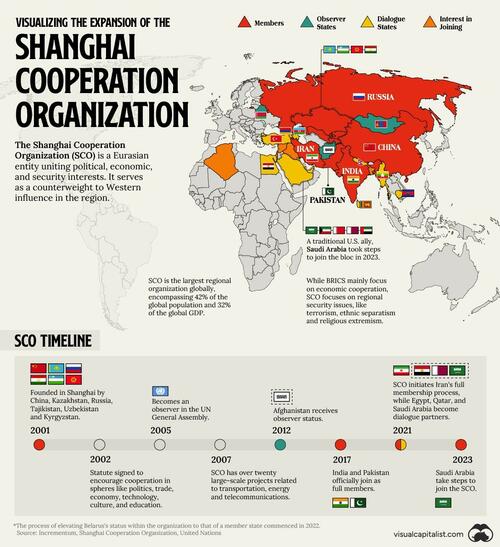See other World News Articles
Title: Visualizing The Expansion Of The Shanghai Cooperation Organization
Source:
[None]
URL Source: https://www.zerohedge.com/geopoliti ... nghai-cooperation-organization
Published: Nov 11, 2023
Author: Tyler Durden
Post Date: 2023-11-11 05:57:58 by Horse
Keywords: None
Views: 45
China has actively pursued the expansion of the Shanghai Cooperation Organization (SCO), a Eurasian political, economic, and international security entity. Established in 2001 by Russia, China, and former Soviet states, the organization serves as a counterbalance to Western influence in the region. Visual Capitalist's Bruno Venditti and Sabrina Fortin created the chart below, using data from Incrementum, the UN, and the SCO, to illustrate the development of the largest regional organization globally. SCO Timeline The SCO, formed with objectives such as combating terrorism, promoting border security, strengthening political ties, and expanding economic cooperation, initially included China, Kazakhstan, Russia, Tajikistan, Uzbekistan, and Kyrgyzstan. In 2002, member states ratified the organization statute to encourage political, trade, economic, technological, cultural, and educational collaboration. Since then, the organization has undertaken over 20 large-scale projects related to transportation, energy, and telecommunications. A notable initiative is China’s expansive Belt and Road Initiative (BRI), which aims to rebuild the Silk Road and connect China to Asia, Europe, and beyond through significant infrastructure investments. The organization has also expanded its geopolitical influence. It attained observer status in the UN General Assembly in 2005 and gave Afghanistan observer status in 2012. Currently, it is working with the interim Taliban administration to include Afghan representatives in its future meetings. India and Pakistan officially became members of the SCO in 2017, and Iran is in the process of obtaining full-time membership. Egypt and Qatar are dialogue partners, and Saudi Arabia, a traditional U.S. ally, has taken steps to join. Belarus is set to become a member in 2024 after signing a memorandum of obligations. Furthermore, the organization also plays a crucial role in Chinese military ambitions. In 2007, the SCO signed an agreement outlining the legal rights and responsibilities for military exercises in another member country. The agreement allows Chinese armed forces to engage in air-ground combat operations abroad, covering activities like long-distance mobilization, counterterrorism missions, stability maintenance operations, and conventional warfare. Military presence is particularly important for the Chinese Communist Party (CCP), which fears that separatist movements in the Uyghur-dominated autonomous region of Xinjiang could gain support from other Central Asian states. Implications for the United States Today, the SCO encompasses 42% of the global population and 32% of the global GDP. Due to its growing influence, U.S. policymakers have been monitoring the development of the Shanghai Cooperation Organization. In a 2020 report to the U.S. Congress, the U.S.-China Economic and Security Review Commission highlighted that through the SCO, China is establishing diplomatic relationships and expeditionary capabilities that could support power projection beyond its borders. According to the document, “there is a significant risk that Beijing may leverage its relationships with SCO countries to limit the ability of U.S. armed forces to operate in Central Asia.” Nonetheless, the same report mentions that the SCO could serve as a beneficial tool for Central Asian states, offering a platform for cooperation and presenting an alternative to potential domination by Russia, particularly in areas such as energy. Poster Comment: Algeria has observer status

Post Comment Private Reply Ignore Thread